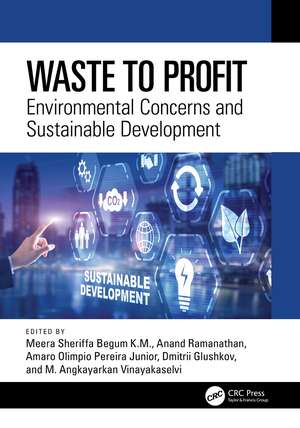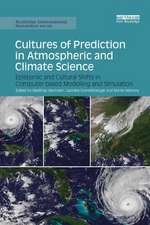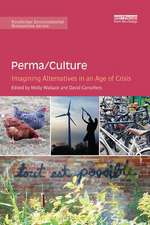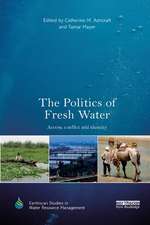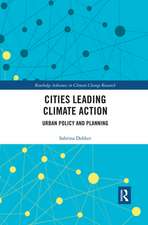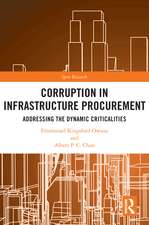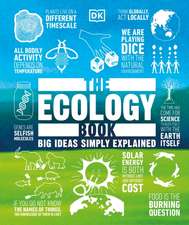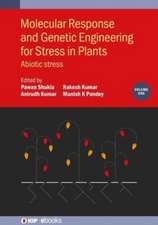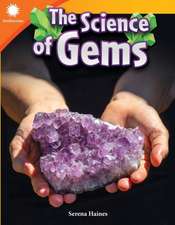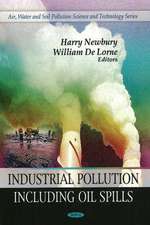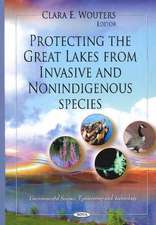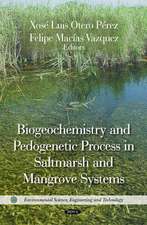Waste to Profit: Environmental Concerns and Sustainable Development
Editat de Meera Sheriffa Begum K.M., Anand Ramanathan, Amaro Olimpio Pereira Junior, Dmitrii O. Glushkov, M. Angkayarkan Vinayakaselvien Limba Engleză Paperback – 29 noi 2024
Features:
- Reviews energy sources and technologies from waste, their environmental interactions, and the relevant global energy policies
- Provides overview of waste-to-energy technologies for a sustainable future
- Explores physicochemical properties involved in the pertinent process and technologies
- Gives a multidisciplinary view about energy conversion and management, planning, controlling, and monitoring processes
- Discusses information in transferring the technologies' industrial level and global level to meet the requirements of different countries
| Toate formatele și edițiile | Preț | Express |
|---|---|---|
| Paperback (1) | 428.54 lei 22-36 zile | +33.12 lei 5-11 zile |
| CRC Press – 29 noi 2024 | 428.54 lei 22-36 zile | +33.12 lei 5-11 zile |
| Hardback (1) | 1126.89 lei 43-57 zile | |
| CRC Press – 19 iun 2023 | 1126.89 lei 43-57 zile |
Preț: 428.54 lei
Preț vechi: 465.80 lei
-8% Nou
Puncte Express: 643
Preț estimativ în valută:
82.01€ • 85.31$ • 67.71£
82.01€ • 85.31$ • 67.71£
Carte disponibilă
Livrare economică 24 martie-07 aprilie
Livrare express 07-13 martie pentru 43.11 lei
Preluare comenzi: 021 569.72.76
Specificații
ISBN-13: 9781032369075
ISBN-10: 1032369078
Pagini: 430
Ilustrații: 182
Dimensiuni: 178 x 254 x 26 mm
Greutate: 0.8 kg
Ediția:1
Editura: CRC Press
Colecția CRC Press
ISBN-10: 1032369078
Pagini: 430
Ilustrații: 182
Dimensiuni: 178 x 254 x 26 mm
Greutate: 0.8 kg
Ediția:1
Editura: CRC Press
Colecția CRC Press
Public țintă
AcademicCuprins
1. Crop Residue to Fuel, Fertilizer, and Other By-products: An Approach toward Circular Economy; 2. Cost-effective Sustainable Electrodes for Bioelectrocatalysis towards Electricity Generation; 3. Green Synthesis of Nanoparticles from Agro-waste: A Sustainable Approach; 4. Conversion of Waste Plastics into Sustainable Fuel; 5. Innovations in Sludge-Conversion Techniques; 6. Scale-up of Microbial Fuel Cells: A Waste-to-Energy Option; 7. Critical Role of Catalysts in Pyrolysis Reactions; 8. Engineering Perspectives on the Application of Photosynthetic Algal Microbial Fuel Cells for Simultaneous Wastewater Remediation and Bioelectricity Generation; 9. Pyrolysis and Steam Gasification of Biomass Waste for Hydrogen Production; 10. Insight into Current Scenario of Electronic Waste to Nanomaterials Conversion; 11. Wastewater Treatment Using Nanoadsorbents Derived from Waste Materials; 12. Environmental Sustainability: An Interdisciplinary Approach; 13. Environmental Movements and Law in India: A Brief Introduction; 14. Co-pyrolysis of Biomass with Polymer Waste for the Production of High-quality Biofuel; 15. Thermal Degradation Behaviors and Kinetics of Pyrolysis; 16. Techniques for Biodiesel Production from Wastes; 17. Environmental Impact of Municipal Waste Energy Recovery Plant; 18. A Comprehensive Review on the Modelling of Biomass Gasification Process for Hydrogen-rich Syngas Generation; 19. A Comprehensive Review of Bio-catalyst Synthesis, Characterization, and Feedstock Selection for Biodiesel Synthesis Using Different Methods; 20. A Techno-economic Analysis of Green Hydrogen Production from Agricultural Residues and Municipal Solid Waste through Biomass-steam Gasification Process; 21. The Energy Potential of Brazilian Organic Waste; 22. Life Cycle Sustainability Assessment of Bioenergy: Literature Review and Case study; 23. Environmental, Social, and Economic Aspects of Waste-to-energy Technologies in Brazil: Gasification and Pyrolysis; 24. Life Cycle Assessment of Lubricant Oil Plastic Containers in Brazil: Comparing Disposal Scenarios; 25. Step towards Sustainability: Fuel Production and Hybrid Vehicles; 26. Microwave Pyrolysis of Composite Fuels with Biomass; 27. Combustion and Pyrolysis Characteristics of Composite Fuels with Waste-derived and Low-grade Components; 28. Analysis of Gaseous Anthropogenic Emissions from Coal and Slurry Fuel Combustion and Pyrolysis; 29. Allothermal Approach for Thermochemical Conversion of Coal-enrichment Waste; 30. Membrane Technology in Circular Economy: Current Status and Future Projections
Notă biografică
Meera Sheriffa Begum K.M. graduated from Anna University, Chennai. She worked at Chennai Petroleum Corporation Ltd. (formerly Madras Refineries Ltd.) in R&D division as “MRL Research Fellow” from 1991 to 1995. She is currently Professor in the Department of Chemical Engineering at National Institute of Technology, Tiruchirappalli, India. She has received many best paper awards in international conferences, has been granted two patents, and has published more than 100 articles in renowned international journals (h-index: 28; i-index: 49; citations 2550). Her research interest is in the fields of separation processes, functional materials for water treatment, alternate fuels, and medical applications. She has authored three chemical engineering textbooks – Process Calculations , Elements of Mass Transfer (Part I) , and Mass Transfer Theory and Practice – and coauthored A Thermo Economic Approach to Energy from Waste. She has also authored seven book chapters. Under her supervision, she has guided several Ph.D. scholars, postgraduates, and undergraduates. She has contributed research, sponsored, and provided consultancy on projects on sustainable functional materials toward environment and energy applications funded by MHRD, DST-SERB, CSIR, MHRD-SPARC, and DST-BRICS. She has undertaken research collaboration and training at NUS, Singapore, through TEQIP in 2006 and has involved herself in consultancy projects on downstreaming applications in distilleries, dairy industries, Southern Railways, etc., professionally related activities, and administrative responsibilities to serve the community.
Anand Ramanathan is currently Associate Professor in the Department of Mechanical Engineering and Associate Dean (Research & Consultancy) in Industry & Outreach at National Institute of Technology, Trichy. He is a recipient of the Australian Endeavour Fellow and worked in the area of solar fuels at Australian National University, Canberra, Australia, in 2015. He also serves as Expert Member of the Centre of Excellence in Corrosion and in Corrosion and Surface Engineering. As a recognition of his contributions, he was awarded N.K. Iyengar Memorial Prize in 2009, Outstanding scientist VIRA Award in 2017, Dr. Radhakrishnan Award in 2018, and NITT’s Best Innovator Award in 2022. His area of specialization is Internal Combustion Engines, and it expands to the field of alternative fuels, waste-to-energy conversion technologies, emission control, and fuel cells. He has guided eight Ph.D. and four MS research scholars and is at present guiding six Ph.D. scholars. His research-oriented scholarship has facilitated him to publish more than 60 Science Citation SCI/Scopus Indexed research journals and presented papers in several international conferences besides presenting a paper in Applied Energy (ICAE2018 – Hong Kong), ASME, USA, and SAE International conferences at Detroit, USA. He has been granted four Indian patents in the area of biocatalyst and biofuel. He has visited Germany, Hong Kong, Italy, France, the United States, and Bangladesh for academic collaborations. He has authored 3 books and 11 book chapters in renowned publications. He has received sponsored projects from IEI-India, DST-SERB, DST-YSS, DST-UKERI, DRDO-GTRE, MHRD-SPARC, and DST-BRICS and developed well-equipped Fuels Laboratory in the Department of Mechanical Engineering at NIT, Trichy. He has undertaken Consultancy for Industry and Administrative responsibilities at NITT.
Amaro Olimpio Pereira Junior is Economist. He has a Ph.D. in Energy Planning from Federal University of Rio de Janeiro. He has worked as technical advisor in the Energy and Environment Department at Energy Research Company (EPE) in Brazil. He has served as Visiting Professor at the Pierre Mendès-France University in Grenoble, France, and at the University of Texas at Austin, Texas. He has worked as Research Fellow at CIRED (Centre International de Recherche sur l’Environement et Dévélopement) in France. Currently, he is Associated Professor of the Energy Planning Program of the Institute of Graduate Studies in Engineering at Federal University of Rio de Janeiro (PPE/COPPE/UFRJ), Researcher at Centro-Clima, Director of the Institute for Strategic Development of the Energy Sector – ILUMINA and Member of the permanent technical committee at LIFE. He has experience in energy and environmental modeling, besides working in the areas of regulation of energy sectors, integration of new technologies, and different energy sources on issues related to climate change. He is author of books, book chapters, and several papers in international journals.
Dmitrii Glushkov has a Ph.D. in Physical and Mathematical Sciences. He is Associate Professor at the National Research Tomsk Polytechnic University, Tomsk, Russia, and has 11 years of research and teaching experience. He is a specialist in combustion theory. His fields of research are combustion processes of composite solid propellants and gel fuels, co-combustion of solid fossil fuels and municipal solid waste, microexplosion of composite fuels, and hot spot ignition. Dr. Glushkov is the head of more than ten major research projects. The main scientific results of over the past 5 years have been published in more than 25 highly rated journals and three monographs.
M. Angkayarkan Vinayakaselvi, Associate Professor of English, Bharathidasan University, Tiruchirappalli, India, has 22 years of teaching experience, including her service at University of Madras, Chennai, and Mother Teresa Women’s University, India. She has won the Travel Grant Award to present paper in North East Modern Language Association, USA. She has authored a book and several research articles and has won Best Presentation and Best Paper Awards. Currently, she is specializing in Environmental Humanities.
Anand Ramanathan is currently Associate Professor in the Department of Mechanical Engineering and Associate Dean (Research & Consultancy) in Industry & Outreach at National Institute of Technology, Trichy. He is a recipient of the Australian Endeavour Fellow and worked in the area of solar fuels at Australian National University, Canberra, Australia, in 2015. He also serves as Expert Member of the Centre of Excellence in Corrosion and in Corrosion and Surface Engineering. As a recognition of his contributions, he was awarded N.K. Iyengar Memorial Prize in 2009, Outstanding scientist VIRA Award in 2017, Dr. Radhakrishnan Award in 2018, and NITT’s Best Innovator Award in 2022. His area of specialization is Internal Combustion Engines, and it expands to the field of alternative fuels, waste-to-energy conversion technologies, emission control, and fuel cells. He has guided eight Ph.D. and four MS research scholars and is at present guiding six Ph.D. scholars. His research-oriented scholarship has facilitated him to publish more than 60 Science Citation SCI/Scopus Indexed research journals and presented papers in several international conferences besides presenting a paper in Applied Energy (ICAE2018 – Hong Kong), ASME, USA, and SAE International conferences at Detroit, USA. He has been granted four Indian patents in the area of biocatalyst and biofuel. He has visited Germany, Hong Kong, Italy, France, the United States, and Bangladesh for academic collaborations. He has authored 3 books and 11 book chapters in renowned publications. He has received sponsored projects from IEI-India, DST-SERB, DST-YSS, DST-UKERI, DRDO-GTRE, MHRD-SPARC, and DST-BRICS and developed well-equipped Fuels Laboratory in the Department of Mechanical Engineering at NIT, Trichy. He has undertaken Consultancy for Industry and Administrative responsibilities at NITT.
Amaro Olimpio Pereira Junior is Economist. He has a Ph.D. in Energy Planning from Federal University of Rio de Janeiro. He has worked as technical advisor in the Energy and Environment Department at Energy Research Company (EPE) in Brazil. He has served as Visiting Professor at the Pierre Mendès-France University in Grenoble, France, and at the University of Texas at Austin, Texas. He has worked as Research Fellow at CIRED (Centre International de Recherche sur l’Environement et Dévélopement) in France. Currently, he is Associated Professor of the Energy Planning Program of the Institute of Graduate Studies in Engineering at Federal University of Rio de Janeiro (PPE/COPPE/UFRJ), Researcher at Centro-Clima, Director of the Institute for Strategic Development of the Energy Sector – ILUMINA and Member of the permanent technical committee at LIFE. He has experience in energy and environmental modeling, besides working in the areas of regulation of energy sectors, integration of new technologies, and different energy sources on issues related to climate change. He is author of books, book chapters, and several papers in international journals.
Dmitrii Glushkov has a Ph.D. in Physical and Mathematical Sciences. He is Associate Professor at the National Research Tomsk Polytechnic University, Tomsk, Russia, and has 11 years of research and teaching experience. He is a specialist in combustion theory. His fields of research are combustion processes of composite solid propellants and gel fuels, co-combustion of solid fossil fuels and municipal solid waste, microexplosion of composite fuels, and hot spot ignition. Dr. Glushkov is the head of more than ten major research projects. The main scientific results of over the past 5 years have been published in more than 25 highly rated journals and three monographs.
M. Angkayarkan Vinayakaselvi, Associate Professor of English, Bharathidasan University, Tiruchirappalli, India, has 22 years of teaching experience, including her service at University of Madras, Chennai, and Mother Teresa Women’s University, India. She has won the Travel Grant Award to present paper in North East Modern Language Association, USA. She has authored a book and several research articles and has won Best Presentation and Best Paper Awards. Currently, she is specializing in Environmental Humanities.
Descriere
This book explains selection of suitable technology for waste treatment and energy recovery under different conditions. It contains techno-economic analysis, life cycle assessment, optimization of tools and technologies including overview of various technologies involved in the treatment of wastes and factors influencing the processes.
